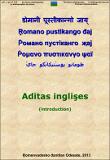The Roma bibliography = Ŗomano pustikango đaj
Abstract
We are delighted to introduce readers and online users to the Ŗomani pustikango đaj / Roma Bibliography. This is the first-ever comprehensive and multilingual bibliography of works on the Roma and all the aspects of their culture. In the past, several attempts were made to compile an exhaustive bibliography of publications in the field of Romani studies, but none lived up to the promise. The Ŗomani pustikango đaj is the most comprehensive and most up-to-date, and even better, it is open access, that is, accessible to all free of charge on the web.
We admire the huge amount of work and care the authors devoted to compiling the Ŗomani pustikango đaj. It is a product of a Roma-led team, who compiled it on a voluntary basis, out of the shared desire to “serve the interests of our [Roma] people”. The authors see this bibliography as “an information infrastructure for the collection, processing, dissemination and use of bibliographic data”.
The bibliography consists of separate files. The first file contains the authors’ Introduction where they explain motivations which led toward its compilation, followed by the explanation of the principles of the Bibliography’s arrangement. The separate files contain the bibliographical items in the alphabetical order.
The Bibliography includes a number of multilingual sources, that is, monographs, articles, reviews, dissertations, expert reports, papers, newspapers, and important non-academic publications. The titles and short annotations are given in the original languages, followed by translations into English and Ukrainian, and in many other instances already into Bulgarian, Czech, French, German, Romanian, Russian, Slovak, and Spanish. And the Authors invite all – Romany and non-Romany activists, scholars, academics - to participate in the further development of this Bibliography to make it really ‘the people’s one’.
The Bibliography employs the Romani alphabet originally proposed by Niko Rergo in 1989, and as pointed “adopted in Ukraine by the Ministry of Education”. Some readers may find it a bit unusual at first, but the alphabet’s conventions and writing principles are clearly explained in the introduction.
The Ŗomani pustikango đaj is an invaluable source for everyone interested in the Roma and in Roma studies. We are extremely grateful to the Authors for consenting to make this Bibliography available to the Library at University of St Andrews. In turn, we also appreciate the Library’s decision to make the Ŗomani pustikango đaj accessible online to all those who might want to consult it.
(Elena Marushiakova and Veselin Popov. ERC Advanced Grant Roma Interbellum)
Type
Book
Rights
Attribution-NonCommercial-NoDerivatives 4.0 International
http://creativecommons.org/licenses/by-nc-nd/4.0/
Collections
Except where otherwise noted within the work, this item's licence for re-use is described as Attribution-NonCommercial-NoDerivatives 4.0 International
Items in the St Andrews Research Repository are protected by copyright, with all rights reserved, unless otherwise indicated.


